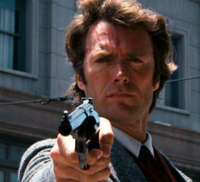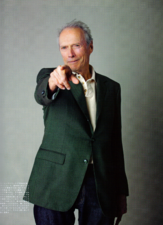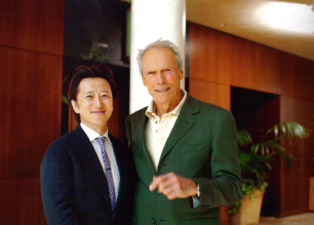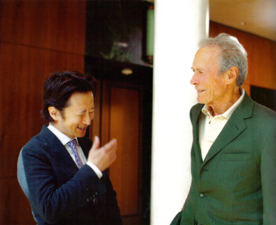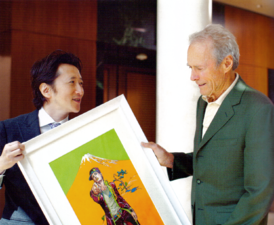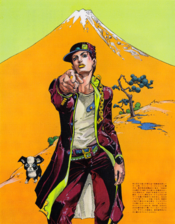User:Vish/Sandbox

|
Note: This is a user's personal page attached to their profile! This is not an actual article, may not be related to JoJo or Araki, and is not associated with the wiki. As such, it may not adhere to the policies. |
Clint Eastwood is an American actor and film maker whose various roles and films greatly influenced Hirohiko Araki's JoJo's Bizarre Adventure series.[1]
He made a lasting mark on the world of cinema with his roles in Westerns and other genres over a career spanning more than six decades. Renowned for his iconic roles such as The Man with No Name in Sergio Leone's Dollars Trilogy and the rugged cop Harry Callahan in Dirty Harry, Eastwood is known for his on-screen persona of the strong, silent type.
Biography
Clint Eastwood was born on May 31, 1930, in San Francisco, California, to Clinton Eastwood Sr. and Margaret Ruth (née Runner).
Influence on Hirohiko Araki
Hirohiko Araki's interest in Clint Eastwood began in 1966 when his father took him to go see one of Eastwood's films. His father was a fan of Eastwood, so they watched For a Few Dollars More together. Although Araki didn't understand the story, he was amazed by the action scenes and followed Eastwood's acting and directing works since then. Araki first referenced the actor in his 1981 debut manga, Poker Under Arms, which took place in a Western setting, and "Eastwood" can be read on a sign in the background in the third page. Araki's interest in the Western genre stemmed from Eastwood being his childhood hero.[2]
Eventually, Eastwood became the ideal hero image for Araki's manga as well, particularly JoJo's Bizarre Adventure;[1] like Eastwood's main roles, Araki sees heroes as loners, who do the right thing without looking for compensation or appreciation from society.[3] The film Dirty Harry was one of Araki's artistic references.[4] Araki stated that Clint Eastwood served as the model for the protagonist of Stardust Crusaders, Jotaro Kujo. Jotaro's trademark pose where he points his finger was inspired by Eastwood pointing his .44 Magnum. Moreover, Jotaro's catchphrase took inspiration from some of Eastwood's dialogue in films, such as "You have to be kidding me..."[3] According to Araki, Sergio Leone once told Eastwood that he doesn't have to act for a scene, but just stand there. This inspired Araki to have Jotaro perform limited movements while fighting, such as standing quietly with his hands in his pockets even while his Stand is throwing incredibly powerful punches.[5][1]
Jotaro was not the only character influenced by Eastwood's roles. In Vento Aureo, Araki doesn't consider Team Bucciarati to be a team with a sense of hierarchy, but rather a group of outcasts who each fight alone in most of their fights.[1] When Guido Mista was young and ran out of money, he would stand outside a movie theater, beat up anyone who badmouthed Clint Eastwood, and then take their money.[6] Mista's favorite film is The Bridges of Madison County, which Eastwood directed and stars in.[7]
Steel Ball Run takes place in a Western setting, where Johnny Joestar and Gyro Zeppeli deviate from their family and societal values, ultimately confronting a large obstacle.[1]
When JoJolion Chapter 18 was published in Ultra Jump in January 2013, the chapter was titled "Trouble with the Curve", based on Eastwood's 2012 film with the same name. When Araki met Eastwood earlier in September 2012, he stated he watched the film without subtitles and still felt emotionally moved by it.[1]
Interviews
No interviews found for Vish/Sandbox
Gallery
Trivia
- When Unforgiven won the Best Picture award in the 65th Academy Awards, Araki was so happy that he couldn't sleep.[8]
- In 2012, Araki's all-time best 10 Clint Eastwood films were The Good, the Bad and the Ugly, Play Misty for Me, Dirty Harry, Escape from Alcatraz, Firefox, Unforgiven, Mystic River, Changeling, Gran Torino, and J. Edgar.[1]
- If Eastwood were to play a character from JoJo's Bizarre Adventure, Araki thinks there would be plenty that would fit him from Steel Ball Run. He thinks Steven Steel would be a good choice both age-wise and because Steven fights against authority.[1]
- If Eastwood were to have a Stand, Araki believes he would give him one that has the ability to create wind. Its gentle breeze would subtly affect his opponent while he steadily attacks them.[1]
- In Episode 5 of Diamond is Unbreakable's English dub, Okuyasu Nijimura says "So go ahead punk, make my day" during his fight with Josuke Higashikata. This is a reference to an iconic line in the film Sudden Impact.
- In the light novel rey infinito, the narration states that if Octavio Luna Kan had a more fortunate childhood, he could have starred as a young Clint Eastwood in Hollywood.[9]
References
- ↑ 1.0 1.1 1.2 1.3 1.4 1.5 1.6 1.7 1.8 1.9 HIROHIKO ARAKI MEETS Clint Eastwood (October 2012)
- ↑ Shonen Jump (May 2006)
- ↑ 3.0 3.1 JoJonium Vol. 8-17 (June 2014)
- ↑ Volume 47 - Tonkam Interview
- ↑ Tokai Lecture (June 2006)
- ↑ Chapter 508: Venice's Santa Lucia Station - Get the "OA-DISC"!
- ↑ Chapter 575: The Requiem Quietly Plays, Part 4
- ↑ Volume 33 - Author's Note
- ↑ rey infinito Chapter 3
